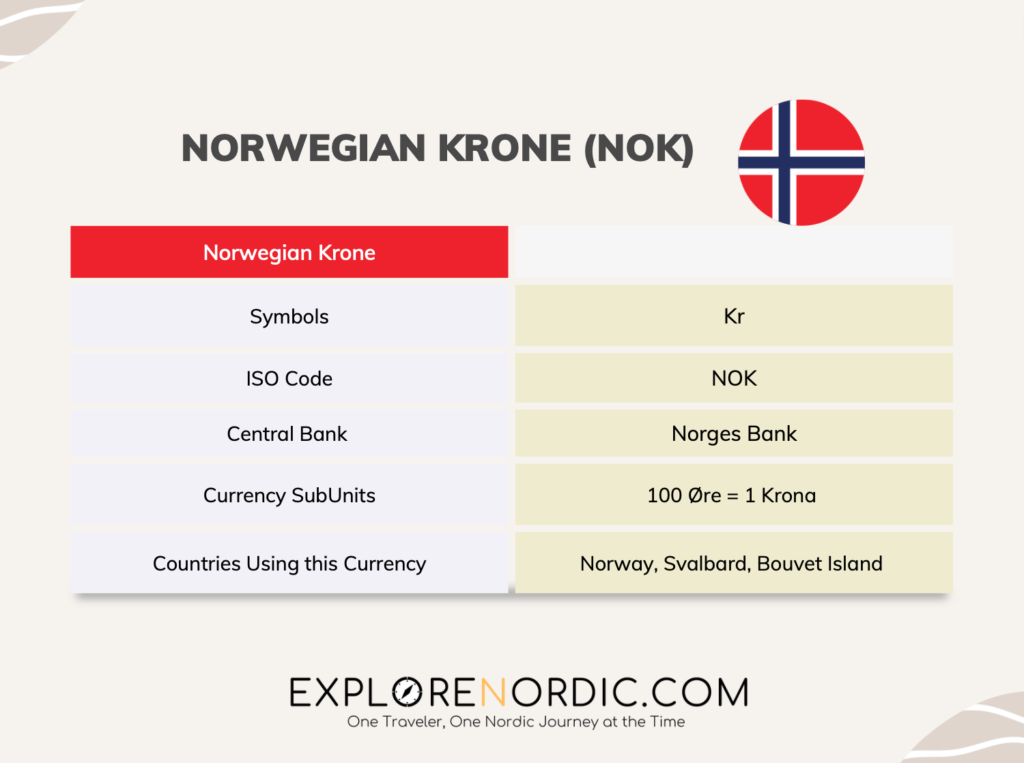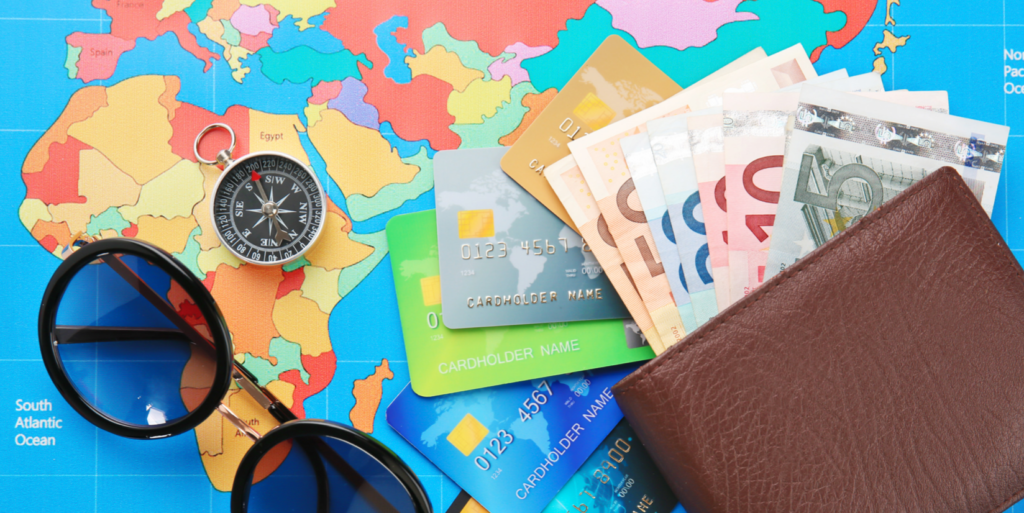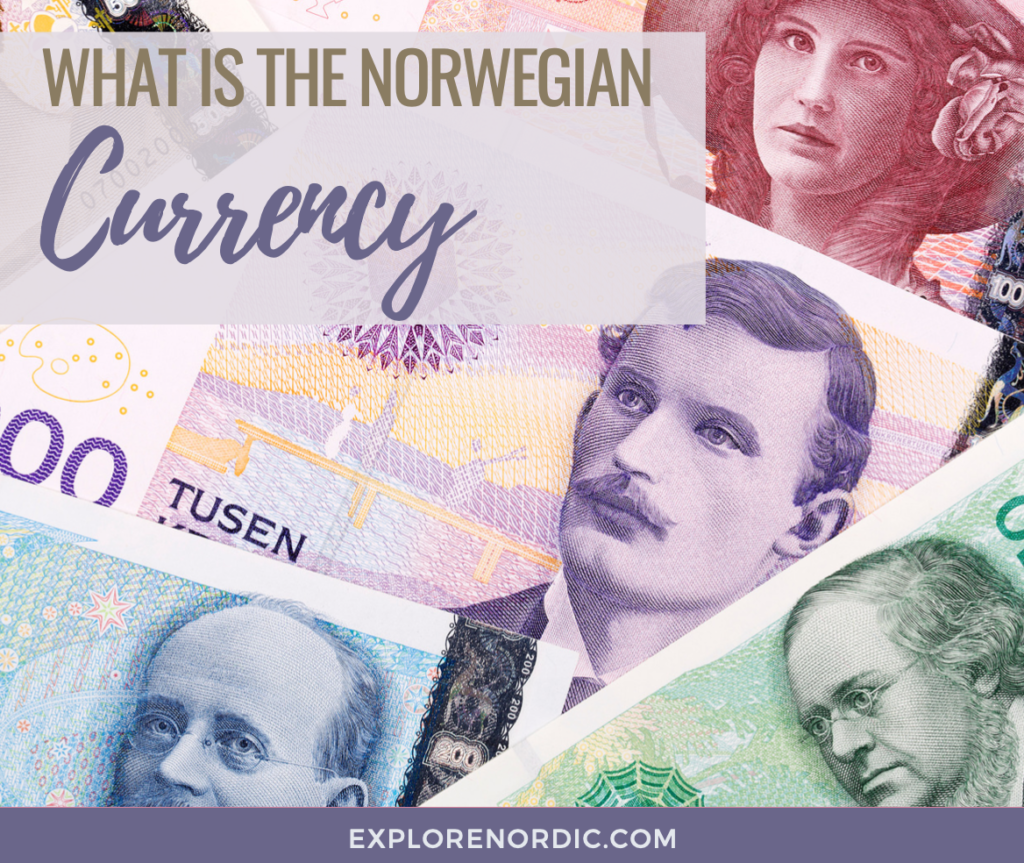What is the Norwegian Currency? The official currency of Norway is the Norwegian Krone (NOK). It is abbreviated as “kr” and is divided into 100 øre. Although, øre were withdrawn and are no longer used in 2012.
Banknotes come in denominations of 50, 100, 200, 500, and 1000 kroner, while coins come in denominations of 1, 5, 10, and 20 kroner. The Norwegian Krone is a floating currency, meaning its value is determined by market forces.

Common Credit Cards in Norway
Credit cards are widely accepted in Norway for the payment of goods and services. The most commonly used credit cards in Norway are Visa and Mastercard, followed by American Express and Diners Club. Some retailers also accept other credit cards such as JCB and UnionPay.
Credit cards can be used to withdraw cash from ATMs, but additional fees may apply. Credit card usage in Norway is generally safe and secure. Chip and pin technology is widely used to prevent fraud.
ATMs
ATMs are widely available in Norway and can be used to withdraw NOK using your debit or credit card. Be aware that your bank may charge additional fees for international withdrawals.
Is Norway a Cashless Society?
Just like Sweden, Norway is often referred to as a cashless society, but this is a bit of an exaggeration. While it is true that electronic and card-based payments have become the norm in Norway, cash is still widely used. It is accepted in many transactions, especially in small retail shops and among older generations.
However, the use of cash has been declining in recent years, with many stores and restaurants only accepting electronic payments. The country has a high level of digitalization, which has made cashless transactions more convenient and efficient. The government and financial institutions have also been promoting the use of digital payments to reduce the use of cash. Norway is becoming increasingly cashless, but it is not completely cashless yet.
Norwegian Exchange Offices
Norwegian Exchange Offices are financial institutions that offer currency exchange services. They provide customers with the ability to exchange one currency for another.
Exchange offices are typically found at airports, train stations, and major cities. They offer competitive exchange rates and charge a fee for their services, which can be higher than the fees charged by banks for similar transactions.
In Norway, exchange offices are regulated by the central bank, Norges Bank, and are required to follow strict anti-money laundering and customer identification procedures. Forex Bank, X-change, Global Exchange, American Express, and Western Union are some of the Exchange offices available in Norway.
It is important to compare exchange rates and fees at multiple exchange offices before making a transaction, as they can vary significantly. Additionally, it is a good idea to check if your bank offers competitive exchange rates and fee structures, as these can often be more favorable than those offered by exchange offices.
Norwegian payment apps
In Norway, there are several payment apps available for consumers to make digital transactions. These apps allow users to send and receive money, pay bills, and make purchases directly from their smartphones or tablet. Some of the popular payment apps in Norway are:
- Vipps: A widely used app that enables users to send and receive money, pay bills, and make purchases with just a few clicks.
- PayPal: A well-established international payment app that allows users to send and receive money, make online purchases, and transfer funds between accounts.
These payment apps have become popular in Norway due to their convenience, security, and ease of use. They have also helped to drive the trend towards a cashless society in Norway.
How Much Cash Can You Bring into Norway?
There is no limit on the amount of money that can be brought into Norway, but amounts exceeding 25,000 NOK (Norwegian Kroner) must be declared to customs if you are traveling from a country outside the European Economic Area (EEA). This includes cash, traveler’s checks, and other monetary instruments.
Declaring large amounts of money helps to prevent money laundering and the financing of terrorism. Failure to declare large amounts can result in penalties, seizure of the funds, and even criminal charges.
It is always a good idea to check the latest regulations and guidelines before traveling, as they can change from time to time. If you have any concerns or questions, you should contact the Norwegian customs authority or your financial institution for more information.
Tipping in Norway

Tipping is not mandatory in Norway, but it is common to leave a small amount for good service, especially in restaurants and cafes. A good way is to round up to the nearest 10 or 100 NOK. Tipping is seen as a way to show appreciation for good service, but it is not expected or required.
Tipping at Norwegian hotels is not common. If you do a tour in Oslo for example, and you receive exceptional service and truly enjoy your experience, than a small tip would be welcomed, but not expected.
In some cases, the service charge may already be included in the bill, so it is important to check before leaving a tip. Tipping is usually done in cash, but it is also possible to add a tip to your bill if you are paying with a credit card.
In general, Norwegians have a more laid-back attitude towards tipping compared to some other countries, and it is not seen as a major cultural expectation. Workers are paid fairly in Norway and are not dependent on tip money.
Fees to Be Aware of
When visiting Norway, there are several fees you should be aware of:
- Currency Exchange Fees: When exchanging currency, you may be charged a fee by the financial institution or exchange office. It is advisable to compare exchange rates and fees before making a transaction.
- Credit Card Fees: Some credit card providers may charge additional fees for international transactions, such as currency conversion fees or foreign transaction fees. Be sure to check with your credit card provider before traveling to Norway.
- ATM Fees: Some banks may charge additional fees for using ATMs in foreign countries. Check with your bank to see if there are any fees for international withdrawals.
Taxes to Be Aware of
As a tourist in Norway, you may be subject to certain taxes, including:
- Value Added Tax (VAT): VAT is included in the price of goods and services in Norway, and ranges from 10-25%. Some goods and services, such as food, books, and medical expenses, are taxed at a lower rate.
- Excise Taxes: Excise taxes are levied on certain goods and services in Norway, such as alcohol, tobacco, and gasoline.
- Tourist Taxes: Some cities in Norway may have a tourist tax, also known as a city tax or tourist fee. This fee is typically added to the cost of your hotel stay and can range from a few Norwegian Kroner to several hundred.
Just good to be aware of the taxes and fees that apply when visiting Norway.
History of the Norwegian Krone
The Norwegian Krone (NOK) is the official currency of Norway. It has a long and rich history dating back to the Middle Ages when Norway was part of the Kalmar Union with Denmark and Sweden. At that time, the monetary system in Norway was based on the Danish currency, the Danish Rigsdaler.
In 1816, when Norway became a separate kingdom, it introduced its own currency, the Norwegian Speciedaler. This currency was in circulation until 1875 when it was replaced by the Norwegian Krone. They also became part of the Scandinavian Monetary Union. Until 1914 the Scandinavian currencies were mutually exchangeable.
Throughout the 20th century, the Norwegian Krone underwent several changes in value due to events such as the Great Depression, World War II, and the discovery of North Sea oil.
1940 – 1945 during the German occupation the Norwegian krone was pegged to the Reichsmark. After World War II the krone was pegged at 1 pound = 20 kroner. Not until 1992 the Central Bank of Norway abandoned the exchange rate system that was fixed and went with a floating exchange rate.
Today, the Krone is a strong and stable currency that is widely accepted in Norway, Svalbard, and Bouvet Island.
The Future of the Norwegian Krone?
The future of the Norwegian Krone (NOK) is a subject of much debate and speculation among economists, investors, and policy-makers. While the Krone has been a stable and successful currency for many years, there are a number of factors that could impact its value and stability in the future.
One of the most important factors affecting the future of the Norwegian Krone is the economy of Norway. Norway has a strong and diversified economy, with significant contributions from the oil and gas, fishing, and shipping industries. However, the country is also heavily dependent on these industries. Changes in the global economy or shifts in these industries could have a significant impact on Krone.
Norway and the Euro
Another factor that could impact the future of the Krone is the continued debate over whether or not Norway should adopt the Euro as its official currency. While a public vote in 1994 rejected the proposal to join the European Union and the Eurozone, there is still ongoing discussion and debate about this issue. If Norway were to adopt the Euro, it would likely have a significant impact on the value and stability of the Krone.
In addition, Krone’s future could be influenced by global economic trends and events. Such as changes in interest rates, shifts in currency exchange rates, and fluctuations in the price of oil. The Krone is closely tied to the global economy and these factors could impact its value and stability in the years to come.
Despite these challenges, it is important to note that the Norwegian Krone has a strong track record of stability and success, and there are many factors that could contribute to its continued success in the future. These include Norway’s strong and diversified economy, its well-established financial sector, and its commitment to responsible fiscal and monetary policies.
Curious about the other Scandinavian Currencies?
- Swedish Currency – the Swedish Krona
- Danish Currency – the Danish Krone





